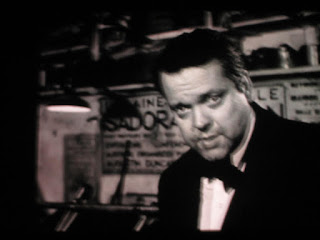Shortly after WWII Orson Welles did a show for American TV called "Around the World with Orson Welles." It was never shown here because half way into the filming Welles got a feature film okayed and he instantly abandoned his other projects. That's too bad. I saw some of it on European formatted discs at Steve Worth's house and can testify that the show was first rate.
His first subject was Basque country which straddles the border between France and Spain. Actually the Basques are neither Spanish nor French and have to put up with a pesky border check right in the middle of their land. It's okay, though...at the time Welles was there the Basques seemed to have a sense of humor about it all.
Welles could have handled the project as a standard Lowell Thomas-type travelogue but instead he decided to focus on a couple of the people who live there. If I had Orson's job I would have picked interview subjects for their diversity: some good, some bad. Orson, on the other hand, picked only one type: people who had kind, civilized faces...people who he knew he'd enjoy talking to. What do you know? That turned out to be just the right thing to do.
He started with an American writer who lives there with her 10 year-old son. Actually she lives in the States and every two or three years takes a Summer in Basque country. She had a theory that everyone needs to escape to an alternative reality on a regular basis.
I'll add that this woman was interesting for another reason. Orson apparently charmed her into attempting to charm him. He brought out the best in her, and when she countered with a seduction of her own...which was meant for Orson...she seduced the film audience as well. Welles was smart to go after that.
But I don't want to give the impression that Welles only interviewed women.
He interviewed this guy (above), who had actually worked in Montana for a while. He was an extremely nice guy who had an admirable wife. It makes you feel good to imagine that the world contains people like that. He was a quiet man of few words but, amazingly, such a person is still capable of holding an audience's interest. How did Welles know that?
In another episode Welles set up in the kitchen of a Viennese restaurant that was famous for its pastries. Here he interviewed only one person, one of the owners. She was a rather nervous woman who had a sunny smile which frequently lapsed into something tragic. For that reason I wouldn't have chosen her for an interview subject, and once again I would have been wrong. The camera loved her!
She had one of those rare faces that seemed to reveal everything she was feeling, no matter how hard she tried to cover it up. She was a bundle of contradictions. She was alternately attracted to Welles and worried that he might do something that would hurt the business. She was vulnerable and strong, romantic yet practical. She definitely wasn't a natural-born restauranteur, yet the business she presided over continued to operate at a high level. She made it work, as G. A. Henty would say, by sheer pluck.
A fascinating subject for an interview!
BTW: a commenter speculates that the writer in the Basque village was New Yorker writer, Lillian Ross. Could that be? I wish I knew.











